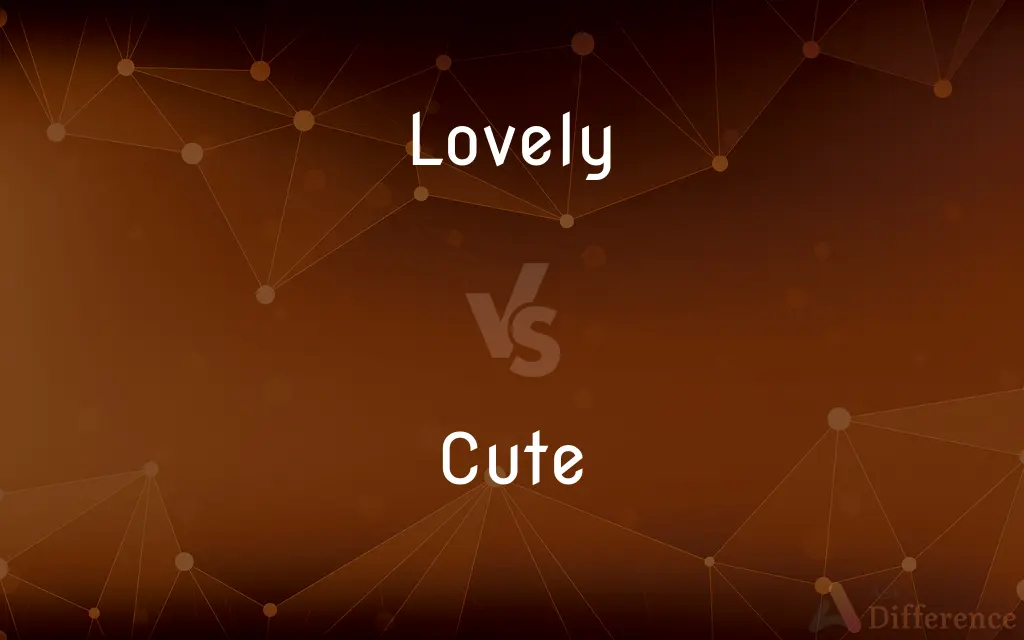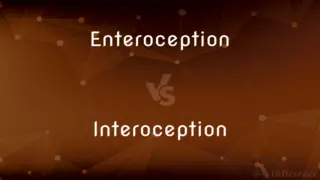Lovely vs. Cute — What's the Difference?
Edited by Tayyaba Rehman — By Urooj Arif — Updated on April 23, 2024
"Lovely" refers to something delightful and appealing in a graceful or elegant manner, whereas "cute" typically describes something charming or endearing in a youthful or small way.

Difference Between Lovely and Cute
Table of Contents
ADVERTISEMENT
Key Differences
Lovely connotes a sense of beauty and attractiveness that is more refined and can apply to a wider range of contexts, such as landscapes, individuals, or experiences, while cute is often associated with things that are small, youthful, or induce a sense of warmth and protectiveness.
Lovely can be used to describe deep affection or admiration, reflecting qualities that evoke emotional resonance, like a lovely poem or a lovely gesture, whereas cute often pertains to superficial, immediately pleasing traits, such as a cute puppy or a cute dress.
Lovely implies a more universal and sometimes romantic appeal, suitable for describing both physical and abstract qualities, while cute is frequently used in informal contexts and tends to evoke a sense of playfulness and fun.
Lovely captures a more enduring, timeless aesthetic or emotional quality, which can be appreciated across different cultures and ages, whereas cute has a more modern, culturally specific usage, often linked to contemporary trends in fashion or media.
Lovely suggests an elegance or a sophistication that can be appreciated on an aesthetic or sensory level, contrasting with cute, which often focuses on elements that are diminutive and not taken as seriously.
ADVERTISEMENT
Comparison Chart
Connotation
Elegant, appealing
Charming, endearing
Common Uses
Describing people, experiences, art
Describing small or young objects or animals
Emotional Response
Deep affection, admiration
Warmth, protectiveness
Suitability
Universal, across ages and contexts
Often informal, culturally specific
Perceived Depth
Timeless, enduring
Often superficial, playful
Compare with Definitions
Lovely
Delightful or pleasant in a dignified, elegant way.
The couple shared a lovely evening at the quiet restaurant.
Cute
Trying to be appealing or attractive, sometimes overly so.
The child’s attempt to impress was awkwardly cute.
Lovely
Worthy of love and admiration.
His lovely nature makes him popular among his peers.
Cute
Pertaining to a style that emphasizes youthfulness and charm.
The character’s design in the animation was very cute.
Lovely
Eliciting feelings of joy and contentment.
The music they played was simply lovely.
Cute
Designed to be quaint or charming.
She bought some cute stationery for school.
Lovely
Inspiring beauty or attractiveness.
She wore a lovely dress to the gala.
Cute
Attractive in a pretty or endearing way, especially small or young.
That kitten is absolutely cute.
Lovely
Exuding charm and grace.
The garden looked lovely in the spring bloom.
Cute
Appealing in a childlike or playful manner.
The baby’s giggle was so cute.
Lovely
Very beautiful or attractive
She looked lovely
Lovely views
Cute
Attractive in a pretty or endearing way
She had a cute little nose
Lovely
An attractive woman or girl
A bevy of lovelies
Cute
Clever or cunning, especially in a self-seeking or superficial way
The two brothers were cute enough to find a couple of rich women and marry them
She had a real cute idea
Lovely
Beautiful especially in a pleasing or charming way.
Cute
Attractive or pretty in a youthful or dainty way
A cute puppy.
A child wearing a cute outfit.
Lovely
Enjoyable; delightful
Had a lovely weekend in the country.
Cute
Obviously contrived to charm; precious
"[He] mugs so ferociously he kills the humor—it's an insufferably cute performance" (David Ansen).
Lovely
(Archaic) Inspiring love or affection.
Cute
Clever or witty, especially in an impertinent or evasive way, as in falsely suggesting that one is ignorant about the matter at hand.
Lovely
(Obsolete) Full of love; loving.
Cute
Possessing physical features, behaviors, personality traits or other properties that are mainly attributed to infants and small or cuddly animals; e.g. fair, dainty, round, and soft physical features, disproportionately large eyes and head, playfulness, fragility, helplessness, curiosity or shyness, innocence, affectionate behavior.
Our reaction to cute attributes is understood as the way nature ensures mammals care for their young.
Lovely
A beautiful person, especially a woman.
Cute
Lovable, charming, attractive or pleasing, especially in a youthful, dainty, quaint or fun-spirited way.
Let's go to the mall and look for cute girls.
Lovely
A lovely object.
Cute
Affected or contrived to charm; mincingly clever; precious; cutesy.
The actor's performance was too cute for me. All that mugging to the audience killed the humor.
Don't get cute with me, boy!
Lovely
Beautiful; charming; very pleasing in form, looks, tone, or manner.
It's a lovely day and the sun is shining.
The music box plays a lovely melody.
The castle garden enchants visitors with its lovely blooms.
Cute
Mentally keen or discerning (See also acute)
Cute trick, but can you do it consistently?
Lovely
Very nice, wonderful.
It would be lovely to have a little more money to spend.
Cute
Evincing cleverness; surprising in its elegance or unconventionality (but of limited importance).
There's a cute alternative proof of this using lambda calculus.
Lovely
(obsolete) Inspiring love or friendship; amiable.
Cute
Clever; sharp; shrewd; ingenious; cunning.
Lovely
(obsolete) Loving, filled with love.
Cute
Pleasantly attractive, in a delicate way; - said of children, young ladies, pet animals and some objects, but seldom of adults; as, a cute child; a cute kitten; a cute little house; a cute statue.
Lovely
Worthy of praise.
Cute
Smart-alecky or impertinent; as, a cute remark.
Lovely
(informal) An attractive, lovely person, especially a (professional) beauty.
A calendar depicting young lovelies in bikinis
Cute
Affectedly clever.
Lovely
Term of fond address.
Goodbye, my lovely.
Cute
Attractive especially by means of smallness or prettiness or quaintness;
A cute kid with pigtails
A cute little apartment
Cunning kittens
A cunning baby
Lovely
A lovely object.
Cute
Obviously contrived to charm;
An insufferably precious performance
A child with intolerably cute mannerisms
Lovely
(informal) In a lovely fashion or manner; beautifully.
Lovely
Having such an appearance as excites, or is fitted to excite, love; beautiful; charming; very pleasing in form, looks, tone, or manner.
Not one so fair of face, of speech so lovely.
If I had such a tire, this face of mineWere full as lovely as is this of hers.
Lovely
Lovable; amiable; having qualities of any kind which excite, or are fitted to excite, love or friendship.
A most lovely gentlemanlike man.
Lovely
Loving; tender.
Many a lovely look on them he cast.
Lovely
Very pleasing; - applied loosely to almost anything which is not grand or merely pretty; as, a lovely view; a lovely valley; a lovely melody.
Indeed these fieldsAre lovely, lovelier not the Elysian lawns.
Lovely
In a manner to please, or to excite love.
Lovely
A very pretty girl who works as a photographer's model
Lovely
Appealing to the emotions as well as the eye
Lovely
Lovable especially in a childlike or naive way
Common Curiosities
Can men be described as cute?
Yes, men can be described as cute, typically when they exhibit charm, youthfulness, or endearing qualities.
How does cultural perception affect the usage of lovely vs. cute?
Cultural perceptions greatly influence how these terms are used, with lovely perhaps carrying more weight and universality, while cute can be seen as more colloquial and trend-sensitive.
What type of products are often marketed as cute?
Products aimed at young consumers, such as toys, casual clothing, and accessories, are often marketed as cute.
What makes something lovely instead of just nice?
Something is described as lovely when it not only pleases the senses or emotions but does so in an elegant or graceful manner.
What age group is most likely to use the term cute?
The term cute is widely used among all age groups but is especially popular among younger people and in contexts relating to fashion, pets, and children.
How do artists convey cuteness in their work?
Artists convey cuteness through features like big eyes, small sizes, rounded shapes, and soft colors.
Can a gesture be cute?
Yes, gestures can be cute, particularly when they are playful, small, or childlike.
Can landscapes be cute?
Landscapes are typically not described as cute; this term is usually reserved for things that are small or exhibit childish characteristics.
Is lovely a stronger compliment than cute?
Lovely might be considered a stronger or more profound compliment than cute, as it often implies deeper beauty and admiration.
Does the term lovely have romantic connotations?
Lovely can have romantic connotations, especially when describing someone's personality or appearance in a deeply affectionate way.
Is there a gender preference for using lovely or cute?
There's no strict gender preference, but cute is often used for women and children more than men, whereas lovely is used more broadly.
How do languages other than English handle these concepts?
Other languages may not differentiate as clearly between the concepts of "lovely" and "cute," depending on cultural context and language structure.
What's the difference between cute and adorable?
While both terms imply endearing qualities, adorable often suggests an even greater degree of charm and appeal, especially in a more innocent or vulnerable context.
What impact does calling something lovely or cute have on perception?
Calling something lovely tends to elevate its status, suggesting quality and appeal, while calling something cute can sometimes diminish its seriousness but increase its approachability.
Can food be lovely or cute?
Food can be described as lovely when it is aesthetically pleasing or particularly well-prepared, and as cute when presented in a playful, miniature, or whimsical manner.
Share Your Discovery

Previous Comparison
Aftcastle vs. Sterncastle
Next Comparison
Enteroception vs. InteroceptionAuthor Spotlight
Written by
Urooj ArifUrooj is a skilled content writer at Ask Difference, known for her exceptional ability to simplify complex topics into engaging and informative content. With a passion for research and a flair for clear, concise writing, she consistently delivers articles that resonate with our diverse audience.
Edited by
Tayyaba RehmanTayyaba Rehman is a distinguished writer, currently serving as a primary contributor to askdifference.com. As a researcher in semantics and etymology, Tayyaba's passion for the complexity of languages and their distinctions has found a perfect home on the platform. Tayyaba delves into the intricacies of language, distinguishing between commonly confused words and phrases, thereby providing clarity for readers worldwide.
















































